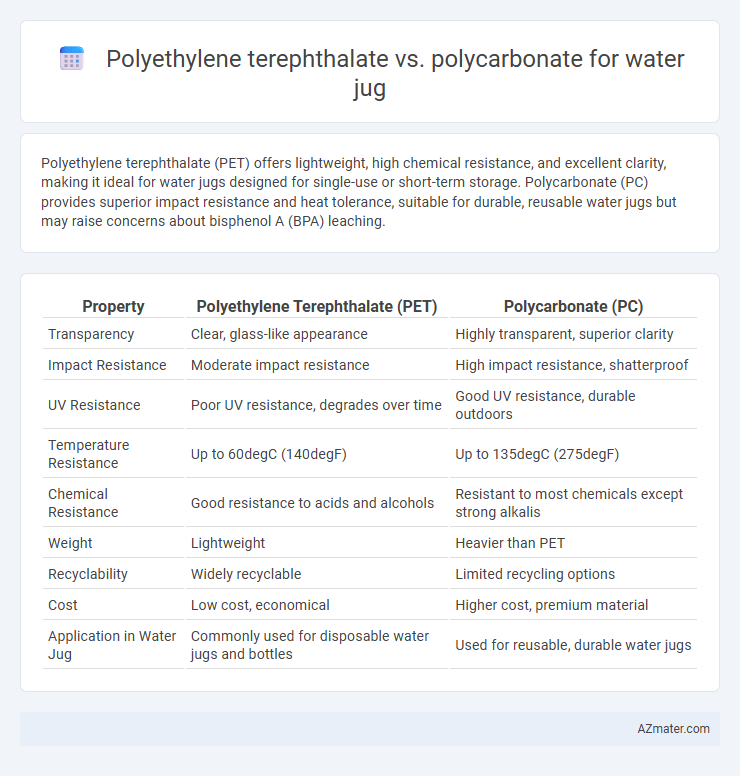Polyethylene terephthalate (PET) offers lightweight, high chemical resistance, and excellent clarity, making it ideal for water jugs designed for single-use or short-term storage. Polycarbonate (PC) provides superior impact resistance and heat tolerance, suitable for durable, reusable water jugs but may raise concerns about bisphenol A (BPA) leaching.
Table of Comparison
| Property | Polyethylene Terephthalate (PET) | Polycarbonate (PC) |
|---|---|---|
| Transparency | Clear, glass-like appearance | Highly transparent, superior clarity |
| Impact Resistance | Moderate impact resistance | High impact resistance, shatterproof |
| UV Resistance | Poor UV resistance, degrades over time | Good UV resistance, durable outdoors |
| Temperature Resistance | Up to 60degC (140degF) | Up to 135degC (275degF) |
| Chemical Resistance | Good resistance to acids and alcohols | Resistant to most chemicals except strong alkalis |
| Weight | Lightweight | Heavier than PET |
| Recyclability | Widely recyclable | Limited recycling options |
| Cost | Low cost, economical | Higher cost, premium material |
| Application in Water Jug | Commonly used for disposable water jugs and bottles | Used for reusable, durable water jugs |
Introduction to Water Jug Materials
Polyethylene terephthalate (PET) and polycarbonate (PC) are two common materials used in water jugs, each offering distinct properties. PET is lightweight, recyclable, and resistant to impacts, making it popular for disposable and reusable water containers. Polycarbonate stands out for its high durability, heat resistance, and clarity, often preferred for long-term use and heavy-duty applications despite concerns about bisphenol A (BPA) content.
Overview of Polyethylene Terephthalate (PET)
Polyethylene Terephthalate (PET) is a strong, lightweight, and transparent thermoplastic polymer widely used for water jugs due to its excellent impact resistance and chemical stability. PET offers superior moisture barrier properties compared to many plastics, ensuring water freshness and safety during storage. Its recyclability and resistance to shattering make PET a popular choice for environmentally conscious consumers seeking durable, safe water containers.
Overview of Polycarbonate (PC)
Polycarbonate (PC) is a durable, impact-resistant thermoplastic commonly used for water jugs due to its high strength and clarity. Unlike polyethylene terephthalate (PET), PC offers superior heat resistance and maintains structural integrity under repeated use, making it ideal for long-term water storage. PC's excellent transparency and BPA-free options also contribute to its popularity in manufacturing safe, reusable water containers.
Durability and Impact Resistance Comparison
Polycarbonate exhibits superior durability and impact resistance compared to polyethylene terephthalate (PET), making it highly suitable for water jugs subjected to frequent handling or drops. PET offers moderate impact strength but is more prone to cracking or deformation under stress, whereas polycarbonate maintains structural integrity and resists shattering even under significant impact. This robustness positions polycarbonate as the preferred material for long-lasting, impact-resistant water containers in demanding environments.
Safety and Health Considerations
Polyethylene terephthalate (PET) is widely favored for water jugs due to its BPA-free composition, reducing concerns about hormone disruption and toxicity during regular use. Polycarbonate, while durable and heat resistant, contains bisphenol A (BPA), raising potential health risks related to endocrine disruption, especially under high-temperature conditions. Choosing PET water jugs ensures safer consumption by minimizing exposure to harmful chemicals commonly associated with polycarbonate containers.
Chemical Resistance and Reactivity
Polyethylene terephthalate (PET) offers excellent chemical resistance against weak acids and bases, making it suitable for water jugs exposed to such substances without degradation. Polycarbonate, while durable and impact-resistant, is more susceptible to chemical reactivity, particularly with alkaline substances and solvents, which can cause stress cracking and compromise safety. PET's higher resistance to chemical attack and lower reactivity ensures longer-lasting, safer water storage compared to polycarbonate in typical usage conditions.
Environmental Impact and Recyclability
Polyethylene terephthalate (PET) is widely recognized for its superior recyclability and lower environmental footprint compared to polycarbonate (PC), as PET recycling streams are well-established and result in lower greenhouse gas emissions. Polycarbonate, while durable and impact-resistant, poses greater environmental challenges due to its complex chemical structure, limited recycling options, and higher production energy consumption. Choosing PET for water jugs supports circular economy principles by enabling efficient material recovery and reducing plastic pollution.
Cost Efficiency Analysis
Polyethylene terephthalate (PET) offers significant cost efficiency for water jugs due to its lower raw material and manufacturing expenses compared to polycarbonate (PC). PET's recycling infrastructure also reduces lifecycle costs, making it economically favorable for disposable and lightweight water containers. Polycarbonate provides superior durability and heat resistance but incurs higher production costs that may not justify its use in cost-sensitive water jug applications.
Common Applications in Water Storage
Polyethylene terephthalate (PET) is widely used for single-use water bottles and lightweight jugs due to its excellent clarity, chemical resistance, and recyclability, making it ideal for portable water storage. Polycarbonate (PC) is favored for reusable water jugs because of its high impact resistance, durability, and superior temperature tolerance, supporting long-term use and resistance to cracking. Both materials serve distinct roles in water storage: PET is optimal for disposable containers, while polycarbonate excels in refillable, sturdy water jugs.
Choosing the Best Material for Water Jugs
Polyethylene terephthalate (PET) offers excellent clarity, lightweight properties, and is highly recyclable, making it a popular choice for water jugs focused on sustainability and convenience. Polycarbonate (PC) provides superior impact resistance and durability, ideal for reusable water jugs requiring long-term use and toughness. Selecting the best material depends on balancing PET's cost-effectiveness and recyclability with polycarbonate's strength and heat resistance, tailored to specific user needs and environmental factors.

Infographic: Polyethylene terephthalate vs Polycarbonate for Water Jug
 azmater.com
azmater.com